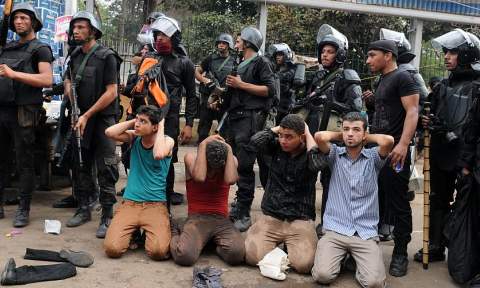
An Egyptian court sentenced a former advisor to Egypt’s first democratically elected President Mohamed Morsi along with 13 other people to life in prison for belonging to an illegal group.
Abdullah Shehata was an economic advisor to Egypt’s President, who was democratically elected in 2012 following the overthrow of longtime dictator Hosni Mubarak.
In 2013, Morsi was removed by a military coup. In the same year, the Egyptian military regime officially declared the Muslim Brotherhood a “terrorist organization”, a move that local and international rights groups strongly criticised.
Shehata and the 13 others sentenced to life terms were accused of weapons possession, belonging to an illegal group and “violating citizens’ freedoms”.
The prosecution accused them of creating “special cells” to receive training in how to make sound bombs, the state-run Al-Ahram daily reported.
They were planning to cause “a state of instability in the country” by targeting essential infrastructure, including electrical transformers, it said.
Six other people were sentenced to 15 years in prison and another to 10 years over the same case, according to state television.
Morsi’s military ouster, led by Abdel Fattah al-Sisi, was followed by a violent crackdown against the Muslim Brotherhood followers and other opposition groups.
On 3 February 2015, Human Rights Watch reported the case of Abdullah Shehata, the former Egyptian Finance Ministry advisor, and his brother who were subjected by interrogators to “electrocution and other mistreatment” to force them to confess to possessing weapons.
“Government silence over reports that police electrocuted a university professor shows how far off course Egypt has drifted since the Arab Spring,” said Nadim Houry, HRW’s deputy Middle East and North Africa director.
“While Egypt faces real security threats, the authorities are responding with methods that aggravate people’s grievances. The 2011 uprising was triggered in part by pervasive police brutality.”
Detainees across Egypt are being subjected to extreme physical and sexual torture in the country’s prisons and police stations, letters smuggled out of jail and family testimonies show.
Torture has long been practiced by Egypt’s security forces and has been condemned for decades by international human rights groups. However, Egypt’s prison population has spiked considerably since the coup.
Along with that spike in the prison population, the number of accounts of mistreatment and torture in Egyptian prisons has also increased.



